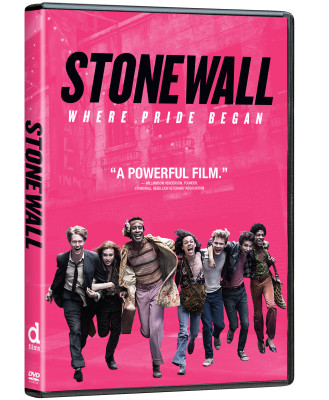
The Stonewall riots were to the gay rights movement what Selma was to the civil rights movement –the catalytic moment when young, hopeless young gays shrugged off the blend in to fit in approach that gotten them nowhere and cried out, ‘Enough!’
Give the importance of the riots, and considering who made the film, Stonewall is depressingly shallow and muddled. Even worse, the bonus features – that could have been highly instructive for anyone new to the story – are little more than self-congratulatory ephemera.
Stone wall opens with black and white clips of the Stonewall riots with background/expository blurbs on their timing and importance before cutting to three months earlier, when a young Kansas high school boy, Danny Winters (Jeremy Irvine, War Horse) arrives in New York and falls in with what at first seems like a very disreputable but colorful crowd. He becomes close with a flamboyant young man named Ray (Jonny Beauchamp, Penny Dreadful’s Angelique).
In counterpoint to Danny’s learning about survival on Christopher Street, the film cuts to the events leading up to his arrival in New York – an unfortunate set of circumstances revealing his relationship with the football team’s quarterback (Karl Glusman) and his being thrown out by his father (David Cubitt), the football coach. The only part of this sequence of events is his relationship with his kid sister, Phoebe (Joey King, Fargo).
In New York, Danny is introduced to the Stonewall – a gay club that’s owned by the mob and run by a vicious thug named Ed Murphy (Ron Perlman, Sons of Anarchy, Hellboy). There he meets a gay activist named Trevor (Jonathan Rhys Meyers, The Tudors, Dracula) – to the consternation of Ray – and witnesses his first raid on the club. Shortly thereafter, he experiences gay bashing first hand.
Stonewall is filled with colorful characters who are composites of several actual figures from the period – and a few historical figures, like Cong (Vladimir Alexis), Marsha P. Johnson (Otoja Abit, The Slap), Murphy and Deputy Seymour Pine (Matt Craven, Resurrection) – most of whom are sketched in mostly by being flashily dressed and exuding attitude.
Outside of Danny, the only characters we get to know at all are Phoebe and Ray. The rest, historical figures or composites, are mostly noise. Even Murphy and Pine are one-note: Murphy being the thug and Pine being the incorruptible cop.
It’s clear that Danny is supposed to be the audience’s eyes – until the moment comes when the violence first breaks out. Then it’s this kid from Kansas who is suddenly throwing the first brick and exhorting everyone to show their power. (Wait. What?)
Even then, the film doesn’t know where to go – the actual Stonewall riots are minimized onscreen to a five-minute slice of a two-hour-plus movie.
Stonewall was written by Jon Robin Baitz (Brother & Sisters, The Slap) and Roland Emmerich (Stargate, Independence Day: Resurgence) – both well out of the closet, so the idea that Stonewall is used as the setting for a ‘new kid in town’ story (in which the new kid starts one of the most important events in gay rights history) is so tone deaf as to almost be insulting.
The bonus material is no better – a featurette called An Important Story is literally Emmerich, Baitz and select cast members telling us this is an important story; Into the Streets is more of the same. The featurette on Marsha P. Johnson gives us next to no actual biographical material at all and the featurette on Ray mostly consists of Beauchamp talking about playing the character.
In all, this is one disappointing package.
Grade: Stonewall – D+
Grade: Features – D+
Final Grade: D+